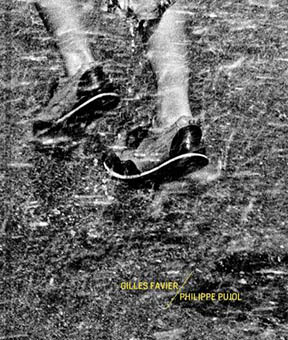LES SEIGNEURS DE NAGUÈRE
Gilles FAVIER
Editeur : LE BEC EN L'AIR
Année de parution : 2016
Au début des années 1990, le ministère de la Culture souhaite dresser un état des lieux de la France et missionne Raymond Depardon pour sillonner les campagnes. Quatre autres photographes sont chargés des banlieues dites « sensibles ». À Gilles Favier, qui réside alors à Paris, échoit Marseille. Il se fixe à La Renaude, une enclave du nord de la ville divisée en deux. En haut les HLM, où vivent les familles arabes. En bas, des cubes de béton, où réside la communauté gitane.
Le photographe y restera un an et demi, réalisant au format 6×6 un reportage en noir et blanc d’une très grande qualité qui demeure, 25 ans plus tard, un témoignage précieux de l’histoire des habitants de La Renaude, et plus largement celle des quartiers Nord de la ville. Pour interroger ce corpus d’images, l’écriture de Philippe Pujol, lauréat du Prix Albert Londres en 2014, s’est imposée. S’appuyant sur le témoignage de personnes photographiées qu’il a retrouvées, il questionne les enjeux de ce quartier dans la grande tradition du journalisme littéraire. FROM THE TROUBLED SUBURBS OF MARSEILLE / BARONS OF THE PAST At the start of the 90s, the ministry of culture in France wanted to assess the state of France and tasked photographer Raymond Depardon with exploring the countryside. Four other photographers took on districts said to be ‘troubled’, with Gilles Favier, who now lives in Paris, taking on Marseille. He focused on La Renaude, a divided enclave in the north of the city: council estates at the top, where Arab families tended to live and cubes of concrete below, where the gypsy community were residing.
The photographer stayed in the area for a year and a half, using a 6×6 medium format in black and white to produce a photo-reportage of the highest quality which, 25 years later, remains a precious record of the story of the inhabitants of La Renaude, and more widely of those of the northern districts of the city. The writing of Philippe Pujol, winner of the Albert Londres Prize in 2014, is essential when contemplating this collection of photos. Based on the account of those people photographed that he met with, he considers the issues of this area through the great tradition of literary journalism.
Le photographe y restera un an et demi, réalisant au format 6×6 un reportage en noir et blanc d’une très grande qualité qui demeure, 25 ans plus tard, un témoignage précieux de l’histoire des habitants de La Renaude, et plus largement celle des quartiers Nord de la ville. Pour interroger ce corpus d’images, l’écriture de Philippe Pujol, lauréat du Prix Albert Londres en 2014, s’est imposée. S’appuyant sur le témoignage de personnes photographiées qu’il a retrouvées, il questionne les enjeux de ce quartier dans la grande tradition du journalisme littéraire. FROM THE TROUBLED SUBURBS OF MARSEILLE / BARONS OF THE PAST At the start of the 90s, the ministry of culture in France wanted to assess the state of France and tasked photographer Raymond Depardon with exploring the countryside. Four other photographers took on districts said to be ‘troubled’, with Gilles Favier, who now lives in Paris, taking on Marseille. He focused on La Renaude, a divided enclave in the north of the city: council estates at the top, where Arab families tended to live and cubes of concrete below, where the gypsy community were residing.
The photographer stayed in the area for a year and a half, using a 6×6 medium format in black and white to produce a photo-reportage of the highest quality which, 25 years later, remains a precious record of the story of the inhabitants of La Renaude, and more widely of those of the northern districts of the city. The writing of Philippe Pujol, winner of the Albert Londres Prize in 2014, is essential when contemplating this collection of photos. Based on the account of those people photographed that he met with, he considers the issues of this area through the great tradition of literary journalism.

Lettre d’information
75004 Paris – France
+33 (0)1 42 74 26 36
ouverture du mercredi au samedi
de 13h30 à 18h30. Entrée libre
M° Rambuteau – Les Halles
Pour Que l’Esprit Vive
Association loi 1901 reconnue d’utilité publique
Siège social :
20 rue Lalande
75014 Paris – France
T. 33(0)1 81 80 03 66
www.pqev.org
20 rue Lalande
75014 Paris – France
T. 33(0)1 81 80 03 66
www.pqev.org

